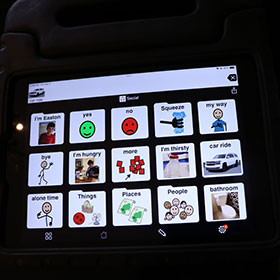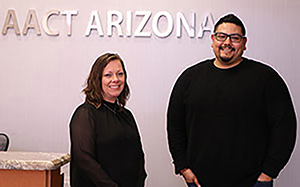Applying Behavioral Therapy Techniques Helps Keep Teen at Home with Family

Easton (red shirt) joins his parents and siblings for a family photo. His mom, Mindy, is second from the left and his dad, Dustin is on the right.
At the age of 19 months, Mindy and Dustin knew that their youngest child, Easton, would need assistance. His speaking skills were regressing, he was no longer maintaining eye contact when interacting with his family, and he started lining up his toys, symptoms common for a child with autism. Seven months later, Easton was diagnosed with autism and became a member of the DES Division of Developmental Disabilities (DDD) in 2007. After Easton lost his ability to speak, he became entirely nonverbal, expressing himself solely through his behavior. However, as he grew into his teens, a frightening new behavior was emerging: self-injury.
Dustin and Mindy did all they could to keep their son safe; they removed his bed frame, which he would rock; padded his bedroom walls; and when necessary, they used therapeutic holds to prevent him from self-injurious behaviors (SIB). Then in November 2021, when he was about 16, “Easton had a full seizure,” reported Mindy.
At the hospital, the emergency room doctor recommended that Easton see “a really good psychiatrist,” and advised Mindy and Dustin to consider admitting their son into a psychiatric hospital.
“I sat in the hospital parking lot, crying,” recalled Mindy. Asking herself, “What do I do?” She and Dustin preferred to have Easton stay at home. They talked to the Medical Director at Aurora psychiatric hospital who sympathized with the parents. “‘I understand,’ he said, ‘If you can do in-home [care], so much better.’“
“We put him on a list [for admission] but I didn’t want it,” explained Mindy. “I wanted my little boy here [at home].” The new psychiatrist they started seeing agreed, offering to help the family keep Easton within his home rather than having him admitted.
The parents were also referred to the Advanced Autism Center for Treatment (AACT), a DDD health plan sub-contracted provider. AACT staff specialize in Applied Behavioral Analysis (ABA) therapy.
When a child exhibits problem behaviors, such as self injury, ABA helps the individual learn to adapt new, more positive behaviors. “Easton showed extreme self-injurious behavior; extreme in [its] magnitude and frequency,” said AACT Program Supervisor, Albert Valenzuela. It was happening every day.”

AACT began providing ABA therapy to Easton in January 2022 with in-home and in-school visits. “We worked with them directly, and the psychiatrist,” said Mindy. During the first few months with AACT, the family just kept trying to keep Easton safe, regulate his medications, and make sure he kept his biweekly visits with the psychiatrist.
Mindy explained that with the help of ABA therapy, “we now have been able to go to doctors’ appointments, we are at dentists again, so he’s being able to go to all those really important meetings that we weren’t able to get him to go to because of the safety issue.” Another plus is that Easton is using his communications device more frequently. “He’s back to [using the device] and he’s using it a lot. He’s communicating!” As of February 2022, restraints were no longer needed to keep Easton safe. “We have no therapeutic holds in this house any more!” exclaimed Mindy.
Dustin shared in celebrating Easton’s improvement, commenting that, “We attribute a lot of [Easton’s progress] to the leadership at AACT. They have been … communicating with us, coming up with ideas for programs to be successful, as well as the psychiatrist. I really attribute [Easton’s] success to that whole team … and everyone willing to not give up. It’s been an amazing turnaround for sure. Not without struggles, but comparing it with where we were, it’s night and day.”
As an example, Dustin explained that transitioning from school, riding in the family’s van, and walking through the door at home had been problematic. Now, Easton exits the van and is “happy coming in” to the house. “We didn’t have a lot of that prior to AACT coming [onboard]. He was constantly upset, didn’t want to come out of the van. Not seeing a big meltdown right there is a big plus from where we were–a big, huge step!”
Mindy confirmed: “It's so rewarding to see his smile coming in [the door]. We know, if he wants another ride, he can ask for another ride [using his communications device]. This is probably the first time in years that he’s more content. Now he can focus and be a little calmer. Lots more smiles, too. If he’s happy, I’m happy.”
In fact, the whole family is happy now that Easton can be safe and happy at home.
Applied Behavioral Analysis

Victoria Diforte, her colleague, Albert Valenzuela, and their team of behavioral technicians helped Easton develop positive behaviors that enable him to remain at home.
Behavioral analysis is the study of human behavior. Applied behavioral analysis is the study of human behavior and applying techniques that improve behaviors so that the individual can function more productively in the world. Applied behavioral analysis (ABA) is used to help children with special needs and problem behaviors develop more positive behaviors. “Most often, it is [used] when the client’s behavior is stopping them from engaging in the world in a way that helps them be successful,” said Victoria Diforte, M.Ed., BCBA, LBA, of the Advanced Autism Center for Treatment (AACT).
DDD members and ABA clients using augmentative communications devices are usually people the ABA therapist would co-treat with a speech pathologist. “We’ll handle the behaviors and the [speech pathologist] will help expand on their linguistics,” said Victoria.
ABA therapy is available to DDD-ALTCS members and is a covered benefit through the DDD Health Plans, Mercy Care and United Healthcare Community Plan. ABA services are available regardless of age or diagnosis and are based on medical necessity. There is no prior authorization process for initial assessment, or completion of a Functional Behavior Assessment. Ongoing treatment requires prior authorization. Plus, there is no longer an age limit. “[ABA therapy] is very much being used to expand and help more and more members ,” said Victoria.
Victoria advises, “If you feel that your family member is struggling to interact with the world, or struggling to communicate, reach out to your DDD Support Coordinator to guide you to an appropriate ABA agency [because there are] agencies that specialize in high needs behavior, high aggression, early intervention.” Some offer clinics, provide in-home or community-based services, or services via telehealth.

